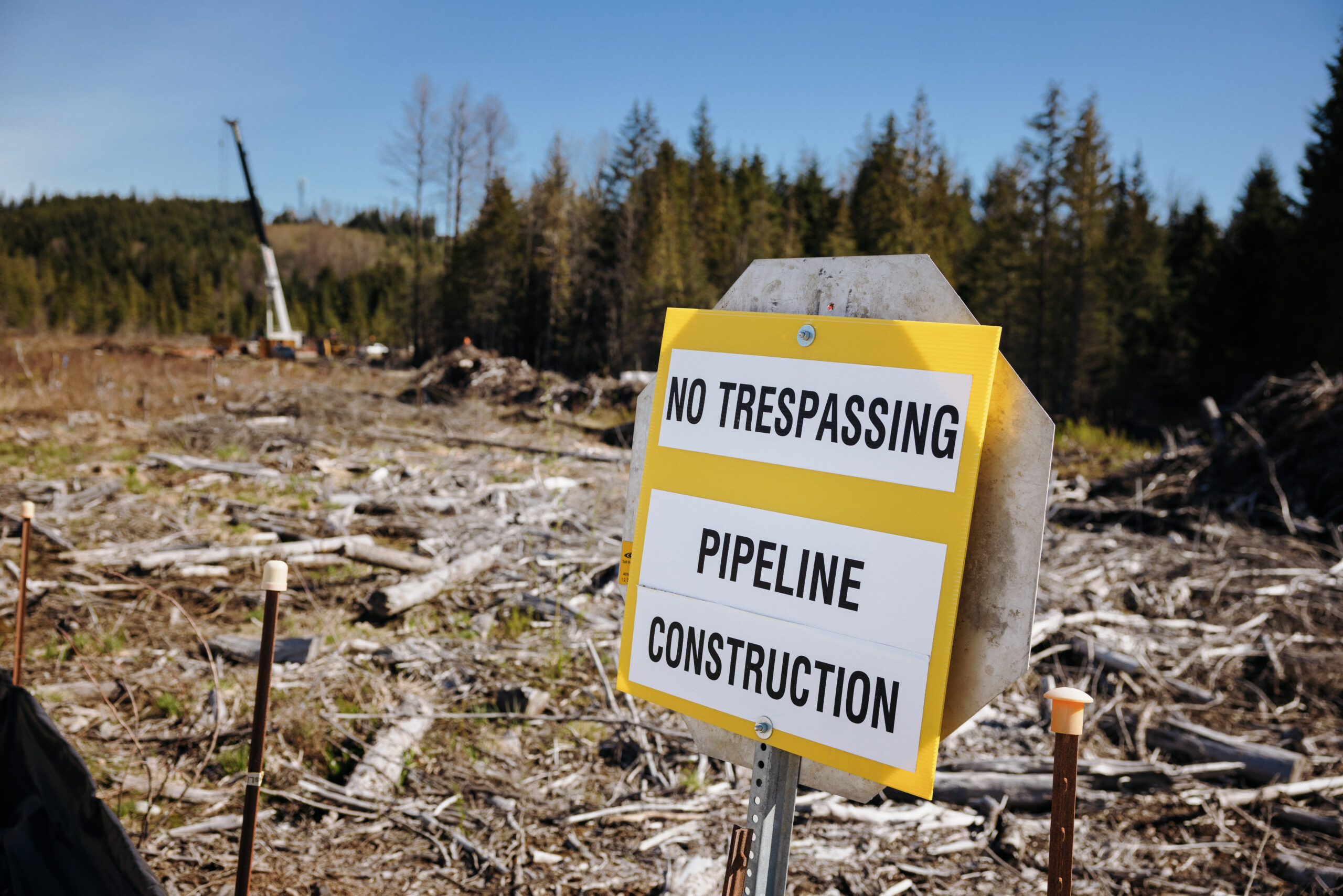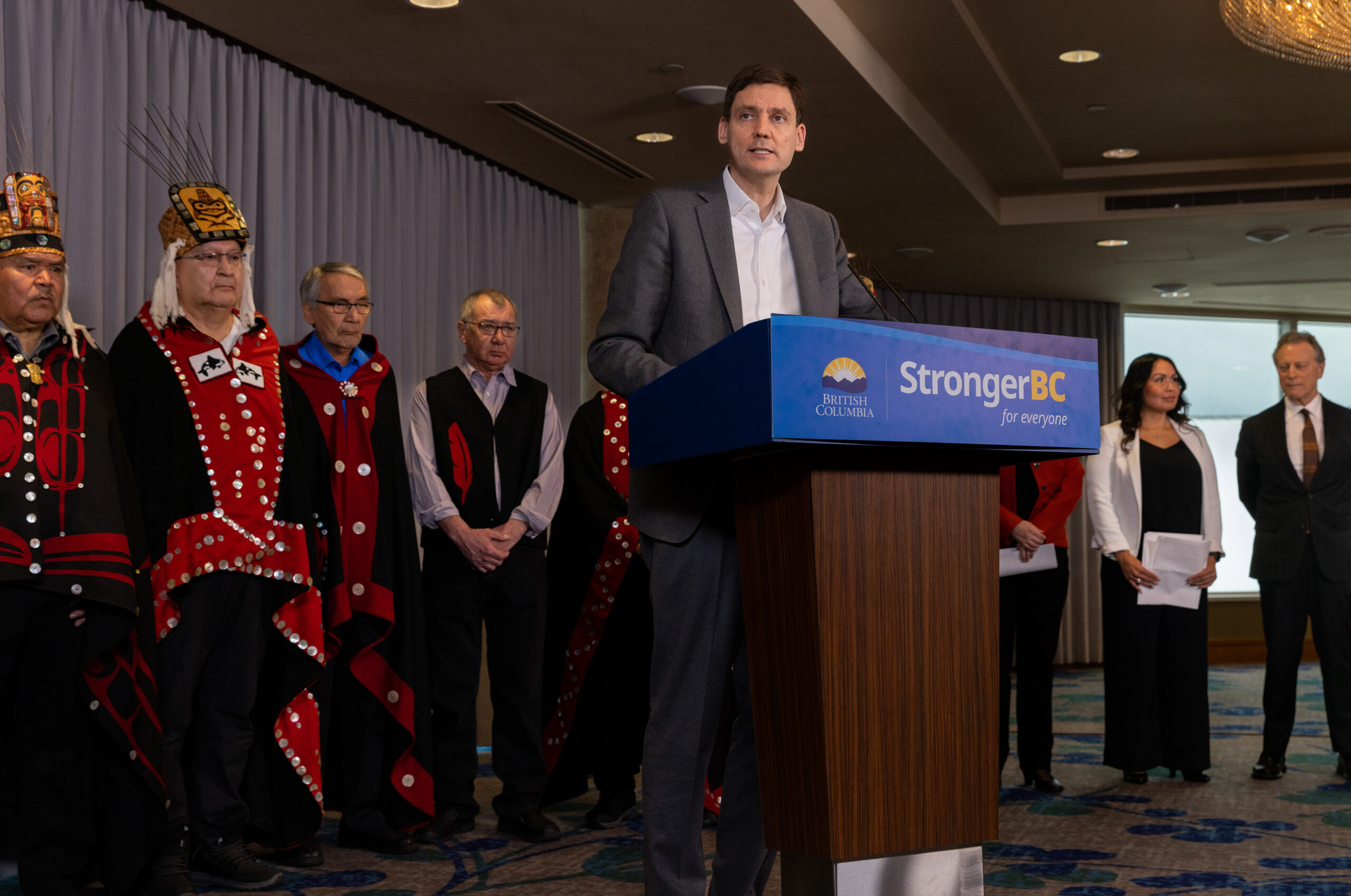
The Narwhal’s in-depth environmental reporting earns 11 national award nominations
From disappearing ice roads to reappearing buffalo, our stories explained the wonder and challenges of...
The call starts as a run-of-the-mill internal corporate presentation.
With a cheerful preamble, Liam Iliffe, a B.C.-based political staffer turned industry executive, introduces himself to his colleagues at TC Energy, a major North American energy company that builds and operates crude oil and natural gas pipelines and other energy infrastructure. He summarizes his background working for the BC New Democrats as a senior advisor under former premier John Horgan. He talks about how his work there included ensuring cross-party support for legislative changes needed to push through the Coastal GasLink pipeline and LNG Canada. The call is a “lunch and learn” session for the company’s external relations employees across North America.
Eight minutes in, things get interesting.
Warming to his task, Iliffe starts to outline strategies he says the multinational fossil fuel company uses to influence provincial, federal and state governments in Canada, the United States and Mexico. The corporation employs lobbyists and analysts in key political centres including Ottawa and Washington D.C. In 2023, TC Energy posted earnings of $11 billion.
Speaking for 42 minutes, Iliffe goes on to claim TC Energy has surreptitiously influenced many major policy decisions.

“We’ve had some really remarkable results in terms of our message being repeated back to us by key decision makers in government,” he says, adding “we’ve been given opportunities to write entire briefing notes for ministers and premiers and prime ministers and it gets stuck on government letterhead.”
He says TC Energy played a pivotal role in excluding pipelines from key climate regulations in British Columbia, saving the company billions in revenue. He claims TC Energy leverages relationships with Canadian ambassadors, Indigenous leaders and senior government officials to sway government decisions. He suggests the company conducts impromptu lobbying of elected officials by placing its staffers in positions where they can “bump into” prominent decision makers in informal settings.
Notably, he claims these tactics were successful in persuading B.C. Premier David Eby to change his mind about taking action to address the climate crisis.
“This is a remarkable achievement over the year,” Iliffe tells his TC Energy colleagues.
The Narwhal obtained two hours of leaked recordings from the call on March 28, 2024, that appeared to implicate TC Energy in a concerted effort to influence premiers, ambassadors, cabinet ministers, the media and more. As part of the reporting, the leaked recordings were analyzed for authenticity and The Narwhal reached out to each party that could be implicated, asking dozens of questions. The recording reveals several key tactics allegedly used to influence government and sway public opinion.
Four days after The Narwhal sent questions to TC Energy about the recording, Iliffe responded with an email on June 17 saying that some events he described did not actually occur and that he had resigned from the company.
“My intent was to emphasize the importance of local relationships TC Energy built in support of projects and operations,” he wrote in an email. “It would be remiss of me to suggest that anyone other than our elected representatives make decisions on behalf of British Columbians.”
“I respect and treasure my relationships with past and present colleagues, partners and elected officials,” the email continued. “Out of respect for those relationships, I have resigned from TC Energy effective immediately to avoid further distractions.”
Two days later, TC Energy said it had reviewed a recording of an internal presentation made by a “former employee.”
“This individual is no longer with the company,” an unnamed spokesperson with TC Energy’s media relations team wrote in an email. “We apologize to the Government of British Columbia, Premier David Eby and all our partners, stakeholders and rights holders for any impact on our valued, trusted and longstanding relationships.”
The spokesperson did not answer specific questions about the contents of the recording and did not specify whether any of the claims made on the recording were true or not.

In response to follow-up questions, TC Energy provided a second statement on June 26 from its senior vice-president of external relations, Patrick Muttart, who said some statements made on the call were untrue. Muttart also said he was disappointed someone had released recordings “which included inaccurate comments from an employee that portray a false impression of how we do business” and that they were released without authorization.
Muttart later provided additional comments to the National Post about the recording.
“The moment I found out about his comments, he took accountability, we took accountability, he is no longer with the company,” Muttart, a former senior political advisor to ex-prime minister Stephen Harper, told the newspaper.
TC Energy has stakes in two pipelines that will supply B.C.’s new liquefied natural gas (LNG) export industry. The recently completed 670-kilometre Coastal GasLink pipeline will send gas from B.C.’s northeast to the LNG Canada project, which was granted billions of dollars of tax breaks and other subsidies by the BC NDP government. The 800-kilometre Prince Rupert Gas Transmission project, set to start construction in August, will supply the Ksi Lisims LNG project currently undergoing environmental assessment. Iliffe noted TC Energy’s natural gas interests are directly linked to expansion of the LNG sector.
“The growth of LNG off the west coast benefits TC Energy: if more gas is coming out of the basin, that benefits us,” Iliffe said on the call.
During his presentation, Iliffe repeatedly emphasized the importance of developing and maintaining relationships with politicians and public servants. He claimed the company regularly engages in lobbying — activities meant to influence public policy, a common practice governed by both federal and provincial laws — outside of business hours.
“You’d be surprised how much work I actually get done in the cooler at Costco because I bump into a significant minister or bureaucrat that I really want to spend some time with and I can do that next to the strawberries or the romaine lettuce,” he said, prompting laughter from some of his colleagues on the call.
According to the recording, this approach reflects TC Energy’s corporate strategy.
“We place people so they can bump into folks at the airport terminal or at the Costco cooler and on a Saturday have a remarkable conversation that flows between personal and professional, that advances our initiatives,” Iliffe said.
Speaking to the National Post, Muttart said the company doesn’t lobby at Costco and that TC Energy has a “robust” lobbying framework.
As The Narwhal reported on Wednesday, B.C.’s attorney general, Niki Sharma, wrote to the provincial registrar of lobbying asking it to review some of the claims made by Iliffe after the government learned about them through questions sent by The Narwhal to the premier’s office. Sharma’s letter noted Iliffe’s registration as a lobbyist did not identify him as a former public office holder, which may have been an oversight.
While Iliffe told The Narwhal that TC Energy was responsible for submitting his lobbying registration, the company did not respond to a question about whether it had made an error in its submission.
Sharma’s letter also noted that her office had conducted its own review of Iliffe’s comments and believed his statements were “untrue.”
On the recording, Iliffe spoke at length of how TC Energy had zeroed in on Eby in what he said were successful efforts to sway the premier’s climate policy — efforts he said intensified shortly after Eby took office in late 2022.
“We had a new premier with a new mandate and that mandate was described on his very first day in office as ‘we cannot continue to expand the fossil fuel infrastructure and hit our climate goals,’ ” Iliffe said. “This set off alarm bells, of course, across industry.”
B.C.’s climate ambitions have long been at odds with its stance on liquefied natural gas (LNG) exports. Natural gas is about 95 per cent methane, an extremely potent greenhouse gas that is the second biggest contributor to global warming after carbon emissions.

The province approved LNG Canada — a joint venture by Shell, Petronas, PetroChina, Korea Gas and Mitsubishi — in 2015. When its first phase comes online around 2025, it plans to power its energy-intensive operations by burning some of the natural gas it would receive daily from the Coastal GasLink pipeline, according to LNG Canada’s project plans filed with the B.C. government. LNG Canada said a second phase would double production. While this could also double the amount of gas it burns domestically, LNG Canada has previously told The Narwhal it has a team exploring options to reduce emissions through electrification.
Meanwhile, B.C.’s 2018 climate plan set targets to reduce emissions across the province from all sources to 40 per cent below 2007 levels by 2030, scaling up to 80 per cent by 2050. It also set a 2030 sectoral target of 33 to 38 per cent reductions from oil and gas activities in the province. Iliffe said Premier Eby faced tough conversations around natural gas and opposition to the sector “needed to be quelled” when he took office.
“So we made efforts to do that,” he said.
Those efforts, Iliffe said, had clear results. “We [find] ourselves now in a position where we have a premier who says that LNG is part of our future.”
Jimmy Smith, Premier David Eby’s press secretary, disputed Iliffe’s claims.

“Since the premier was sworn into office in 2022, B.C. has made significant policy changes in relation to the energy sector,” Smith wrote in an email. He said Eby’s “comments and actions” since taking office show a “clear and persistent commitment to B.C.’s climate plan” that included implementing an emissions cap for the oil and gas industry.
“Premier Eby highlights that these climate commitments are not a hindrance to our economy but rather represent a significant opportunity for growth and prosperity because of how B.C. is positioned,” Smith said.
The premier’s deputy chief of staff, Don Bain, who was lobbied by Iliffe at least four times since 2023 according to provincial lobbying filings, also denied Iliffe’s claims.
“On a few occasions, Mr. Iliffe and I spoke on the phone on issues relevant to TC Energy and my role as lead on various energy-related files including the sale of the Prince Rupert Gas Transmission line from TC to the Nisg̱a’a Nation,” Bain told The Narwhal in a statement. “Mr. Iliffe’s self-aggrandizing claims have no basis in reality.”
Iliffe claimed TC Energy staffers reached out to “international thought leaders and diplomats” to influence the new premier. He said when Eby and some of his cabinet ministers went to Japan, South Korea and Singapore on a trade mission in 2023, TC Energy’s Ottawa bureau reached out to Canadian ambassadors to brief them on desired messaging to give to British Columbia officials about the natural gas sector.
“We know that premiers, when they go to countries, have dinners with ambassadors,” he said. “That’s a one-on-one period of time that an ambassador can deliver our message. Leveraging our relationships allowed us to have Canadian ambassadors abroad deliver a pro-LNG message to a premier who was skeptical at the time.”
The result, Iliffe said, was “a marked shift in language when he came home.”
“We have a shift in government position, a clear shift. We have public comments and policy development that are positive for TC Energy’s initiatives being made daily by the British Columbia government. We didn’t find ourselves there a year ago.”
The Narwhal sent a request on June 17 for interviews with Canadian ambassadors who met with Eby on his trade mission in Asia. Global Affairs Canada declined interview requests, but confirmed Canada’s ambassador to Japan, Ian McKay, visited an oil and gas conference hosted in Vancouver in July 2023 and attended a reception hosted by TC Energy.
This occurred after Eby’s trade mission to Asia, a spokesperson with Global Affairs said in an emailed statement. The federal department added McKay did not meet “directly” with any company officials, but did not explain what it meant by that.

The federal department confirmed McKay and Eby discussed the LNG industry and other sectors during the premier’s visit to Japan.
The federal department also said that Canada’s Trade Commissioner Service helps Canadian oil and gas companies “sell their products and services outside Canada.”
“Promoting Canadian oil and gas solutions to enable the energy transition is a priority for the [Trade Commissioner Service], which leverages its global network of trade commissioners in over 160 cities worldwide to advance commercial interests,” the statement said.
Muttart, the senior vice-president at TC Energy, confirmed to the National Post that the company is “informing, educating and engaging with not just Canadian diplomats but other diplomats representing other countries.”

Saying the company achieved “remarkable results” in exerting its influence over the premier, Iliffe applauded a decision by the B.C. government to approve Cedar LNG, an Indigenous-owned gas liquefaction and export facility that will receive its supply from Coastal GasLink. He also referenced the government’s favourable statements about the proposed Ksi Lisims LNG facility, a Nisg̱a’a-led project currently undergoing environmental assessment.
“All of this effort is for naught if there isn’t Indigenous support or at least Indigenous non-objection,” he said. “A government of any stripe, in British Columbia particularly, is not going to push projects forward unless there’s Indigenous support.”
The NDP government’s endorsement of natural gas had already taken a significant step forward last year, when Premier Eby announced the decision to approve the Haisla-led Cedar LNG project. One the same day, the government said new regulations would require all new proposed LNG projects to have a credible path to achieve net-zero emissions by 2030. The rules would target facilities that liquefy methane-heavy natural gas, but pipelines — including those operated by TC Energy — were exempt.
Smith said the new regulations were brought in “to ensure oil and gas sector projects fit within B.C.’s climate commitments and create new opportunities for people in clean energy and technology.”
“This framework ensures some development can occur, while also ensuring we meet our climate goals,” Smith wrote in an emailed statement.

“We were able to cut ourselves out of that,” Iliffe claimed, saying the regulations’ exclusion of pipelines more than halved operating costs, which “saves TC and our partners and our customers billions of dollars over the operational lifetime of their projects.”
It wouldn’t be the first time TC Energy lobbied the government to water down emissions regulations. As The Narwhal previously reported, the fossil fuel company asked the federal government to exclude methane from its emissions cap.
But Iliffe said the company’s tactics go beyond lobbying elected officials. He claimed the company also works with “influential bureaucrats,” internal ministry staff who tend to keep their jobs when an elected government changes, to “make certain that our messaging and our advice is landing on their letterhead.”
“A really interesting thing about government is that you’ve got a lot of people, public servants, who are overworked and underpaid and sometimes they just want the job done for them,” he said. “We’ve had instances where we’ve been given opportunities to write entire briefing notes for ministers and premiers and prime ministers and it gets stuck on government letterhead and put into an envelope and into a briefing package that goes to that elected figure. There’s nothing more powerful than that.”
Robin Librach, a spokesperson with Natural Resources Canada, denied the allegations.
“Briefing notes for high-level political and public officials are developed by public servants,” Librach wrote in an emailed statement. “External stakeholders have no role in drafting briefing notes, and are not privy to them.”
Smith, with Premier Eby’s office, said the B.C. government reviewed Iliffe’s comments and “found no evidence that support his claims.” Smith called them “complete fabrications.”
“In fact, lengthy internal energy and climate policy development processes, cabinet decisions records and briefing note drafting protocols contradict his claims directly,” Smith wrote in an emailed statement.
Smith said public servants draft briefing notes from “extensive consultative work” that involves a wide variety of stakeholders. “This is done to provide the widest range and most accurate advice on the subject under consideration,” he wrote, adding senior government officials review drafts before briefing notes are shared with cabinet.
However, there are cases when industry views make it directly into government briefing notes. For example, in 2022, The Narwhal obtained documents through freedom of information legislation that showed how natural gas lobbyists discussed a landmark Supreme Court decision around Indigenous Rights with provincial public servants. After the court found B.C. guilty of infringing on Blueberry River First Nations Treaty Rights, lobbyists’ warnings about specific economic impacts were passed on to senior B.C. government officials, including the deputy minister of Energy, Mines and Low Carbon Innovation, without analysis or counter arguments.

After concluding his presentation, Iliffe opened up the call to questions and discussion.
An unknown speaker asked Iliffe about the recently announced sale of the Prince Rupert Gas Transmission pipeline, noting some politicians and public servants in Ottawa are interpreting the deal as “TC Energy’s retreat from LNG.”
Iliffe responded by saying the response in British Columbia has been different.
“We have an advantage in B.C. in that we are pursuing aggressively CGL phase two and Cedar LNG,” he said, referring to Coastal GasLink’s approved expansion which would double the amount of gas it plans to start shipping this year.
“We have delivered a message that we aren’t going anywhere. We’re not going anywhere.”
Get the inside scoop on The Narwhal’s environment and climate reporting by signing up for our free newsletter. On a warm September evening nearly 15...
Continue reading
From disappearing ice roads to reappearing buffalo, our stories explained the wonder and challenges of...

Sitting at the crossroads of journalism and code, we’ve found our perfect match: someone who...

The Protecting Ontario by Unleashing Our Economy Act exempts industry from provincial regulations — putting...
